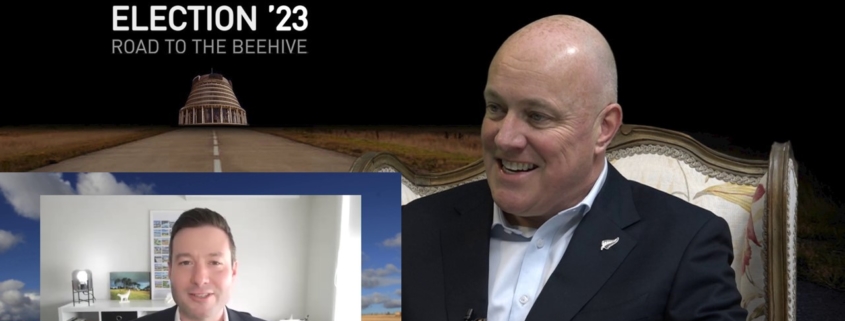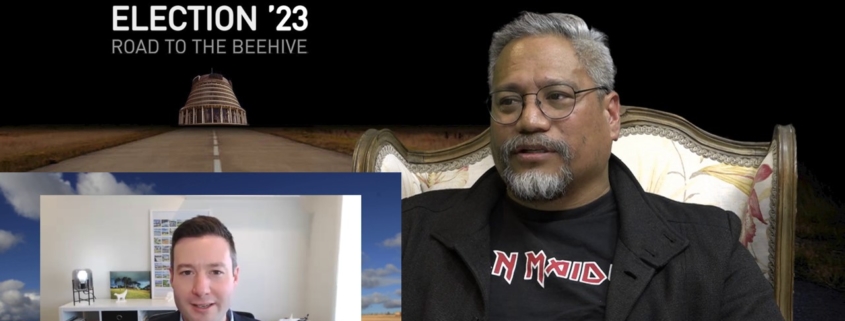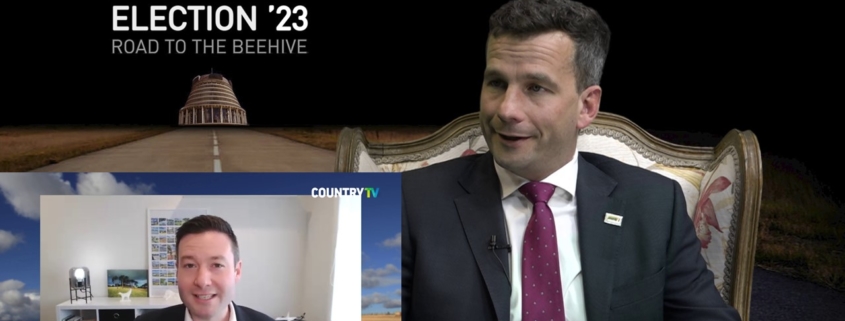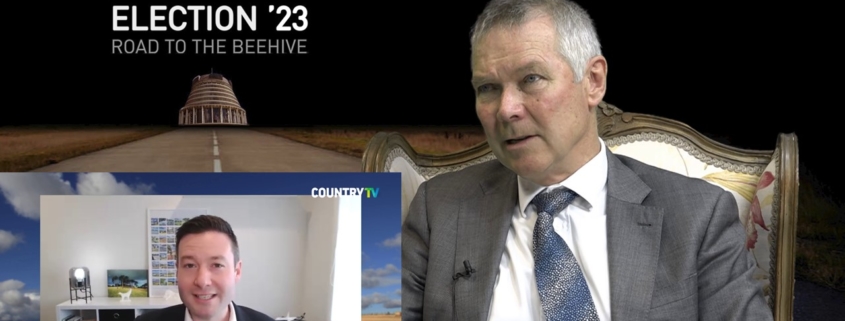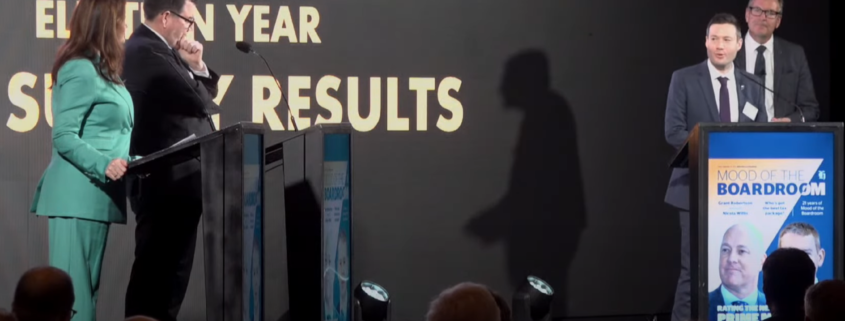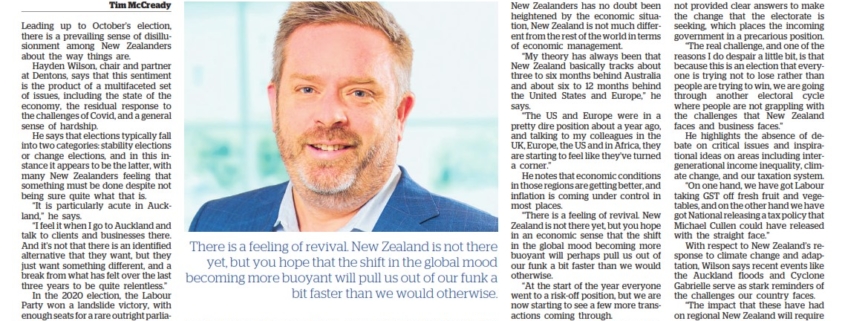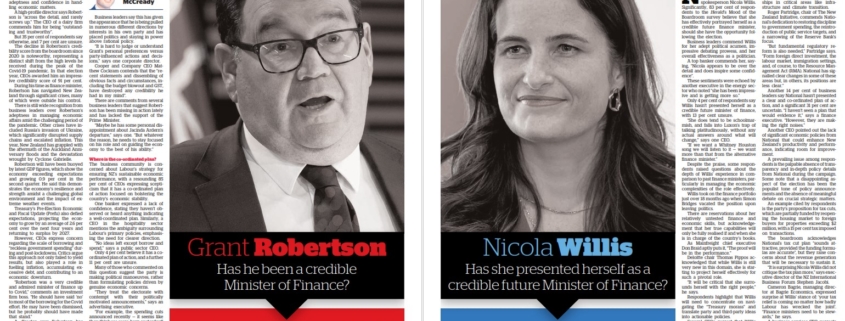Mood of the Boardroom: Our next Finance Minister (NZ Herald)
Grant Robertson – ‘Outstanding and trustworthy’
CEOs continue to back Grant Robertson as a credible Minister of Finance. Some 58 per cent say he has been credible in the position, acknowledging his adeptness and confidence in handling economic matters.
A high-profile director says Robertson is “across the detail, and rarely screws up.” The CEO of a dairy firm commends him for being “outstanding and trustworthy”.
But 35 per cent of respondents say otherwise, and 7 per cent are unsure.
The decline in Robertson’s credibility score from the boardroom since 2020 is noteworthy, representing a distinct shift from the high levels he received during the peak of the Covid-19 pandemic. In that election year, CEOs awarded him an impressive credibility score of 91 per cent.
During his time as finance minister, Robertson has navigated New Zealand through significant crises, many of which were outside his control.
There is still wide recognition from business leaders over Robertson’s adeptness in managing economic affairs amid the challenging period of the pandemic. Other crises have included Russia’s invasion of Ukraine, which significantly disrupted supply chains and escalated inflation. This year, New Zealand has grappled with the aftermath of the Auckland Anniversary floods and the devastation wrought by Cyclone Gabrielle.
Robertson will have been buoyed by latest GDP figures, which show the economy exceeding expectations and growing 0.9 per cent in the second quarter. He said this demonstrates the economy’s resilience and strength amidst a challenging global environment and the impact of extreme weather events.
Treasury’s Pre-Election Economic and Fiscal Update (Prefu) also defied expectations, projecting the economy to grow by an average of 2.6 per cent over the next four years and returning to surplus by 2027.
However, CEOs express concern regarding the scale of borrowing and “reckless government spending” during and post-lockdowns. Critics argue this approach not only failed to yield results, but also played a role in fuelling inflation, accumulating excessive debt, and contributing to an economic downturn.
“Robertson was a very credible and admired minister of finance up to Covid,” comments an investment firm boss. “He should have said ‘no’ to most of the borrowing for the Covid effort. He may have been dismissed, but he probably should have made that stand.”
A director says Robertson has displayed “terrible fiscal performance, with poorly targeted payments that have made inflation worse”.
Another concern CEOs point to is Robertson’s recent policy inconsistencies that have emerged over the campaign period. He had previously criticised the notion of eliminating GST from specific food products, referring to it as a “boondoggle”. As part of its cost-of-living policy, Labour has announced it will remove the tax off fresh fruit and vegetables.
This has required Robertson to reconcile his past statement with Labour’s election pledge.
Business leaders say this has given the appearance that he is being pulled in numerous different directions by interests in his own party and has placed politics and staying in power above rational policy.
“It is hard to judge or understand Grant’s personal preferences versus party-influenced actions and decisions,” says one corporate director.
Cooper and Company CEO Matthew Cockram contends that the “recent statements and dissembling of obvious facts and circumstances, including the budget blowout and GST, have destroyed any credibility he had in my mind”.
There are comments from several business leaders that suggest Robertson has been missing in action lately and has lacked the support of the Prime Minister.
“Maybe he has some personal disappointment about Jacinda Ardern’s departure,” says one. “But whatever the reason, he needs to stay focused on his role and on guiding the economy to the best of his ability.”
Where is the co-ordinated plan?
The business community is concerned about Labour’s strategy for ensuring NZ’s sustainable economic performance, with a resounding 85 per cent of CEOs expressing scepticism that it has a co-ordinated plan of action focused on bolstering the country’s economic stability.
One banker expressed a lack of confidence, stating they haven’t observed or heard anything indicating a well-coordinated plan. Similarly, a CEO in the hospitality sector mentions the ambiguity surrounding Labour’s primary policies, emphasising the need for clearer direction.
“No ideas left except borrow and spend,” says a public sector CEO.
Only 4 per cent believe it has a co-ordinated plan of action, and a further 11 per cent are unsure.
Many of those who commented on this question suggest the party is making political manoeuvres, rather than formulating policies driven by genuine economic concerns.
“They treat the electorate with contempt with their politically motivated announcements,” says an advertising executive.
“For example, the spending cuts announced recently — it seems like they think we were born yesterday!”
Others bemoan a perceived lack of ambition and ability within the party, suggesting their ideas have stagnated to the point where borrowing and spending were the only strategies left.
CEOs emphasise the critical need for effective policies that incentivise rather than burden business.
“Regrettably, Labour seems to think business will keep on keeping on, regardless of the policies imposed on them,” says one.
“Listening and implementing good policies for business would make New Zealand more successful economically, there is no doubt about it.”
Nicola Willis – ‘Impressive and getting more so’
New Zealand’s top chief executives are impressed with National’s finance spokesperson Nicola Willis. Significantly, 83 per cent of respondents to the Herald’s Mood of the Boardroom survey believe that she has effectively portrayed herself as a credible future finance minister, should she have the opportunity following the election.
Business leaders commend Willis for her adept political acumen, impressive debating prowess, and her overall effectiveness as a politician.
A top banker commends her, saying, “Nicola appears to be over the detail and does inspire some confidence”.
These sentiments were echoed by another executive in the energy sector who noted “she has been impressive and is getting more so.”
Only 4 per cent of respondents say Willis hasn’t presented herself as a credible future minister of finance, with 13 per cent unsure.
“She does tend to be schoolmarmish, and falls into Luxon’s trap of talking platitudinously, without any actual answers around what will change,” says one CEO.
“If we want a Whitney Houston song we will listen to it — we want more than that from the alternative finance minister.”
Despite the praise, some respondents raised questions about the depth of Willis’ experience in comparison to past finance ministers, particularly in managing the economic complexities of the role effectively.
Willis took on the finance portfolio just over 18 months ago when Simon Bridges vacated the position upon leaving politics.
There are reservations about her relatively untested finance and economic skills, but acknowledgement that her true capabilities will only be fully realised if and when she is in charge of the country’s books.
As Mainfreight chief executive Don Braid aptly puts it, “The proof will be in the performance.”
Deloitte chair Thomas Pippos acknowledged that while Willis is still very new in this domain, she is starting to project herself effectively for such a pivotal role.
“It will be critical that she surrounds herself with the right people,” he says.
Respondents highlight that Willis will need to concentrate on navigating the “Treasury morass” and translate party and third-party ideas into actionable policies.
Several CEOs suggest that Willis would make a superior leader for the National Party compared to Christopher Luxon. One observes that “she has been polished, and more so than Chris”. “She would be a fabulous leader,” says another.
A co-ordinated plan of action for New Zealand
Business leaders were asked to assess whether the National Party has presented a co-ordinated plan of action for the upcoming election focused on ensuring New Zealand’s sustainable economic performance.
Just over half of respondents — some 55 per cent — believe it has presented a co-ordinated plan of action, highlighting National’s emphasis on disciplined public expenditure and advocacy for public-private partnerships in critical areas like infrastructure and climate transition.
Roger Partridge, chair of The New Zealand Initiative, commends National’s dedication to restoring discipline to government spending, the reintroduction of public service targets, and a narrowing of the Reserve Bank’s focus.
“But fundamental regulatory reform is also needed,” Partridge says. “Form foreign direct investment, the labour market, immigration settings, and, of course, to the Resource Management Act (RMA). National has signalled clear changes in some of these areas but, in others, its positions are less clear.”
Another 14 per cent of business leaders say National hasn’t presented a clear and co-ordinated plan of action, and a significant 31 per cent are uncertain. “I haven’t seen a plan that would evidence it,” says a finance executive. “However, they are making the right noises.”
Another CEO pointed out the lack of significant economic policies from National that could enhance New Zealand’s productivity and performance, indicating room for improvement.
A prevailing issue among respondents is the palpable absence of transparency and in-depth policy details from National during the campaign. Some note that a disappointing aspect of the election has been the populist tone of policy announcements and the absence of meaningful debate on crucial strategic matters.
An example cited by respondents is the party’s proposition for tax cuts, which are partially funded by reopening the housing market to foreign buyers for properties exceeding $2 million, with a 15 per cent tax imposed on transactions.
The boardroom acknowledges National’s tax cut plan “sounds attractive, provided the funding formulas are accurate”, but they raise concerns about the revenue generation that will be necessary to sustain it.
“It is surprising Nicola Willis did not critique the tax plan more,” says executive director of the NZ International Business Forum Stephen Jacobi.
Cameron Bagrie, managing director at Bagrie Economics, expressed surprise at Willis’ stance of: ‘your tax relief is coming no matter how badly Labour has wrecked the joint’. “Finance ministers need to be stewards,” he says.
A business services CEO suggests that National’s favoured approach to policies — including its tax plan — is to point out the things that aren’t good enough, and then conclude without anything to back it up that they would do better.
“The business community and New Zealanders deserve much more of a plan from them in advance of the election. Otherwise, we can reasonably conclude they won’t do things much better than Labour has.”
Suggests another: “This announcement is simply political in nature aimed at attracting votes from their so-called ‘squeezed middle’.”

